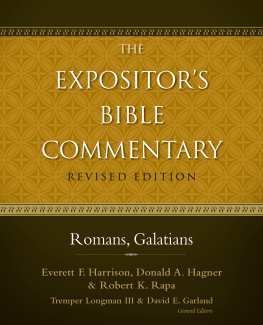University of Navarra - The Navarre Bible: Romans and Galatians
Here you can read online University of Navarra - The Navarre Bible: Romans and Galatians full text of the book (entire story) in english for free. Download pdf and epub, get meaning, cover and reviews about this ebook. year: 2005, publisher: Four Courts Press, genre: Religion. Description of the work, (preface) as well as reviews are available. Best literature library LitArk.com created for fans of good reading and offers a wide selection of genres:
Romance novel
Science fiction
Adventure
Detective
Science
History
Home and family
Prose
Art
Politics
Computer
Non-fiction
Religion
Business
Children
Humor
Choose a favorite category and find really read worthwhile books. Enjoy immersion in the world of imagination, feel the emotions of the characters or learn something new for yourself, make an fascinating discovery.
- Book:The Navarre Bible: Romans and Galatians
- Author:
- Publisher:Four Courts Press
- Genre:
- Year:2005
- Rating:3 / 5
- Favourites:Add to favourites
- Your mark:
- 60
- 1
- 2
- 3
- 4
- 5
The Navarre Bible: Romans and Galatians: summary, description and annotation
We offer to read an annotation, description, summary or preface (depends on what the author of the book "The Navarre Bible: Romans and Galatians" wrote himself). If you haven't found the necessary information about the book — write in the comments, we will try to find it.
University of Navarra: author's other books
Who wrote The Navarre Bible: Romans and Galatians? Find out the surname, the name of the author of the book and a list of all author's works by series.
The Navarre Bible: Romans and Galatians — read online for free the complete book (whole text) full work
Below is the text of the book, divided by pages. System saving the place of the last page read, allows you to conveniently read the book "The Navarre Bible: Romans and Galatians" online for free, without having to search again every time where you left off. Put a bookmark, and you can go to the page where you finished reading at any time.
Font size:
Interval:
Bookmark:
We know more about St Pauls life than aboutthat of any other Apostle even St Peter or St John thanks to theinformation to be found in his Epistles and in St Lukes Acts of the Apostles;yet it is not possible to construct a complete biography of Paul from thesesources, for the simple reason that they were not written with a biographicalor autobiographical purpose in mind. However, by using the Epistles and Acts wecan identify the main features of his personality which comes across verydirectly in the Epistles and the general outline of his life (with some gaps)from his youth up to the time he was martyred.
He was born in Tarsus (cf. Acts 2 1:39; 22:3),the capital of Cilicia, a busy commercial city and a cultural centre of someprominence. He was brought up there and returned to the city a number of timeseven after his conversion to Christianity (cf. Acts 9:30; 11:25; Gal 1:21). Hebelonged to the tribe of Benjamin and was a zealous Pharisee (cf. Phil 3:5;Acts 23:6). In his letters he calls himself Paul (Paulos), but prior tohis conversion he seems to have preferred to be known as Saul (Shaul): itwas quite common for Jews living in Roman territories to use two names Latinor Greek, and Hebrew. In Acts he calls himself Saul up to Acts 13:9; and fromthen on, Paul. His early education in Tarsus was along traditional lines,typical of a Jewish boy living in a Greek-speaking province of the Empire. Hisletters show him to be utterly at home in the Greek koin, the oral andwritten lingua franca: he has a great mastery of this language but doesnot use academic turns of phrase. As a young man he seems to have been keen onathletics, as suggested by his use of the language of the Games to illustratehis spiritual teaching. but places and scenery and monuments do not seem to have interestedhim, despite the fact that he was much travelled.
In addition to this Hellenistic and humanistictraining, he also received a specifically Jewish education, going to Jerusalemwhen still very young, probably to be trained as a rabbi; he attended theschool of Gamaliel (cf. Acts 22:3), one of the most prominent rabbis of thetime and an enthusiastic Pharisee (cf. Gal 1:14). He probably began to studyHebrew, the religious language of the Jews, while still in Tarsus, and becamesteeped in that language during his period in Jerusalem, as well as masteringthe Aramaic dialect of Palestine (cf. Acts 21:40; 22:2). In line withrabbinical custom, St Paul learned and worked at a trade: he became a tentmaker (skenopois) a term which can also cover subordinate jobs,such as harness-making and canvas-making.
During his rabbinical studies in Jerusalem,probably shortly after the death of our Lord, we find him a committedpersecutor of Christians (cf. Acts 7:58; 8:1; 9:1; 22:20) and the initiator ofthe spread of that persecution to the Jewish quarter of Damascus.
However, as he was approaching that city, armedwith the High Priests authority to arrest Christians, the risen Lord appearedto him; this vision, and the influence of grace, brought about Saulsconversion; there and then he realized that he had been completely in the wrong(cf. Acts 9:1-9; 22:5-11; 26:9-18). This instantaneous conversion (cf. Phil3:12), which the Apostle later described as radically changing his life (cf. 1Tim 1:13), was caused by his being directly called by Jesus; Paul was takencompletely by surprise and was always convinced that this calling came fromGod.
Immediately after this experience on the road,Saul was brought to Damascus, where he was spoken to by Ananias, who hadreceived a vision telling him of Sauls vocation (cf. Acts 9:10-19). Saulrecovered his sight (he had been blinded by the vision) and was baptized (cf.Acts 9:18-19), and he immediately set about preaching Gods mercy and bearingwitness that Jesus, who had truly appeared to him on the road to Damascus, wasthe Messiah and Son of God (cf. Acts 9:20-22; Gal 1:15-17). A short time afterthis, Saul withdrew to Arabia (most likely the south-west of present-day Syria)and later returned to Damascus (cf. Gal 1:15-17), wh ere he receivedfurther instruction in the Christian faith and again bore witness to the risenChrist. As a result, the Jews began to persecute him until he eventually had togo into hiding and escape from the city by night, the disciples letting himdown in a basket from a window in the walls (cf. Acts 9:23-25).
He then made his way to Jerusalem, where, thanksto the good offices of St Peter and St Barnabas, he was welcomed by theChristian community, who at first were suspicious of their former persecutor(cf. Gal 1:18; Acts I 19:26-28). Disputes with Jews once again put his life atrisk (cf. Acts 9:29) and his new Christian brethren brought him to Caesarea,where he took ship for his native Tarsus (cf. Acts 9:30). From there he went onto other cities in Cilicia and Syria where he spent four or five years, bearingwitness to his Christian faith (cf. Gal 1:21-24) and encouraged all the time byBarnabas (Acts 11:25-26). This period ended with a further visit by Paul andBarnabas to Jerusalem to bring the Christians of Judea monies collected torelieve their needs (cf. Acts 11:27-30).
St Luke provides us (in Acts 13:1 - 21:16) withthe broad outline of the years which follow, years of intense missionary work.St Pauls apostolic base was Antioch in Syria; he started out from there andgravitated back there, except after his third and last journey, when he headedfor Jerusalem. The last main stage in his life begins in Jerusalem.
First journey The basicinformation about this journey is contained in Acts 13:1 - 14:28. By directinspiration of the Holy Spirit, Barnabas and Paul set out to spread the Gospel(cf. Acts 13:1-4), accompanied by John Mark, then a young man. They preached ina number of cities in Cyprus (cf. Acts 13:4-12) and then went back to themainland to visit Pamphylia, Pisidia and Lycaonia (in the south-west ofpresent-day Turkey); there also they preached in quite a number of towns and inmost cases eventually met with violent opposition from Jews settled there. InLystra, after rejecting divine honours, Paul was stoned at the instigation ofJews who had come from Iconium and Antioch of Pisidia (where Paul had given avery memorable speech to Jews and converts to Judaism; cf. Acts 13:16-43). Theythen made their way back to Syrian Antioch, and there we witness the first clashwith Judaizing Christians, who had come from Jerusalem and were insisting thatChristians of pagan background observe the Mosaic Law (cf. Acts 15:1-2).
The Antiochene Christians decided to send Pauland Barnabas to Jerusalem, to consult with the Apostles on the matter (cf. Acts15:2-3). These, in what is known as the Council of Jerusalem, determined thatChristians were under no obligation whatever to observe the ritual,disciplinary and other precepts of the Mosaic Law (cf. Acts 15:4-29).
Second journey Our basicsource of information about this journey is Acts 15:36 - 18:22. Paul andBarnabas decided to leave Antioch to visit the churches founded during theirfirst missionary journey (cf. Acts 15:36), but they fell out over whether tokeep Mark with them (cf. Acts 15:37-39). Barnabas, with Mark, went off toCyprus (cf. Acts 15:39), while Paul, with Silas as his assistant, toured thechurches of Syria and Cilicia (cf. Acts 15:40-41). In Lystra they were joinedby Timothy (cf. Acts 16:1-3). They then went on into Phrygia and Galatia, wherethey founded new Christian communities (cf. Acts 16:4-8). In Troas Paul had thevision of the Macedonian in a dream (cf. Acts 16:9-10) and as a result crossedover into Europe, where the first cities he visited were Neapolis and Philippi(cf. Acts 16:11-15). At Philippi Paul and Silas were beaten with rods andimprisoned (cf. Acts 16:16-24) but were then set free through a miracle (cf.Acts 16:25-40). They moved on to Thessalonica (cf. Acts 17:1-9) and Beroea (cf.Acts 17:10-14). Silas and Timothy stayed on in Beroea (cf. Acts 17:14), whilePaul, in the company of some recent converts, went on to Athens (cf. Acts
Font size:
Interval:
Bookmark:
Similar books «The Navarre Bible: Romans and Galatians»
Look at similar books to The Navarre Bible: Romans and Galatians. We have selected literature similar in name and meaning in the hope of providing readers with more options to find new, interesting, not yet read works.
Discussion, reviews of the book The Navarre Bible: Romans and Galatians and just readers' own opinions. Leave your comments, write what you think about the work, its meaning or the main characters. Specify what exactly you liked and what you didn't like, and why you think so.













